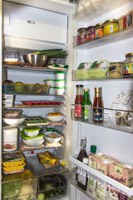Prairie Fare: Is food stored in my refrigerator or cupboard still safe to eat?
(Click an image below to view a high-resolution image that can be downloaded)
* Editors - Please note this corrected version with updated information.
“Am I settling a bet?” I asked.
They laughed. I could tell I was on speaker phone.
“Yes, we want your opinion,” one of them said.
“Is there money involved for you?” I teased.
“No money is involved, just bragging rights,” one of them answered.
I had better have a good answer I thought. Since this happened a few years ago, I do not remember the exact question. The overall topic was how long food can be stored.
Their food in question was nearing antique status. They were good natured when I told them the food was too old to eat. I gave them “permission to toss.”
People often question dates on canned and packaged foods. Sometimes, food that is safe and high quality is thrown out. “Antique” foods are not necessarily safe or high in quality.
Food product dates are “best by” dates, even though some people call the dates “expiration dates.”
Food product dates are not required on products with the exception of infant formula, which may decrease in nutritional value and/or safety. Treat the date on infant formula as an “expiration date” and do not use it beyond the date.
We do not always have exact answers about whether food is “safe.” Let’s try a few questions about food safety.
- You made a large pot of “Cowboy Beans” in your slow cooker the day ahead of your party. Can you cool the food safely in your slow cooker? Name three ways to cool the food quickly.
- You discovered a frozen turkey breast in the bottom of your freezer from two years ago. Is it still safe to roast? Why or why not?
- You accidentally put an opened bottle of barbecue sauce in your cupboard. You estimate that the sauce has been there for two weeks. Is it safe?
- You noticed several bottles of various sauces in your refrigerator. Some are nearing the end of the package date. How long will the sauces maintain their quality?
Here are my best answers.
- Although you might be tempted to put a full slow cooker in the refrigerator to cool, that is not a good plan. Improper cooling is among the leading causes of foodborne illness. When food stays in the danger zone (40 to 140 degrees Fahrenheit) too long, bacteria and other microorganisms can grow and/or produce toxins that can sicken you (or your guests) within as little as an hour.
You can cool food quickly by dividing it into shallow pans and refrigerating. Thick food such as chili should be no more than 2 inches deep and thinner foods, no more than 3 inches deep. As a second option, you can make an “ice bath” in your sink and put the food in a bowl surrounded by ice water in your sink. Be sure to stir. As option 3, you can leave out part of the liquid during preparation and add ice cubes directly to the soup or stew to cool it. - Yes, the turkey is safe to use indefinitely as long as it has remained solidly frozen. In other words, did you have a power outage that may have thawed and refrozen the turkey? Be sure to thaw the turkey safely, not on a counter. You can thaw the turkey in the refrigerator or under cool (70 F) water in a clean sink. You also can cook turkey from the frozen state, but it will take about 50% longer. In the case of our two-year-old frozen turkey, you might baste it with broth more often during roasting at 325 degrees Fahrenheit to keep it juicy and flavorful.
- Technically, barbecue sauce and other opened condiments such as a ketchup are “acidified foods.” That means their pH or acidity value has been adjusted to be at a level that does not support the growth of bacteria. However, if you notice off-colors, bad aromas or flavors, toss it. Barbecue sauce and other condiments technically are safe at room temperature for several weeks as long as you have the lids in place. That’s why you see ketchup bottles on the tables in restaurants. Although you can consume the condiment stored at room temperature, you probably want to keep the sauce in the refrigerator for longer storage and better quality.
- Condiments such as barbecue sauce and ketchup stored in your refrigerator will be at best quality up to nine months. If you find that you are not using condiments quickly, you might want to find recipes to use them or buy smaller bottles the next time.
Here’s a recipe to make use of canned goods that might be on your shelf and condiments that may be in your refrigerator. Visit www.ag.ndsu.edu/food and check out “Pinchin’ Pennies in the Kitchen” (under “Food Preparation”) that shows how to use foods you have on hand. Search online for the “Food Storage Guide” from NDSU Extension.
Cowboy Beans
4 strips bacon, fried until crisp, drained and crumbled
1 pound extra-lean ground beef, browned and drained
1 medium onion, chopped
¼ cup brown sugar
1 cup ketchup
¼ cup vinegar
¼ cup mustard
1 (15.5-ounce) can kidney beans, drained and rinsed
1 (15.5-ounce) can butter beans, drained and rinsed
1 (15.5-ounce) can lima beans, drained and rinsed
1 (28-ounce) can baked beans (do not drain)
Brown meat and fry bacon. Mix all ingredients and cook in a slow cooker on high for three hours or low for eight hours.
Makes 12 servings. Each serving has 250 calories, 4.5 grams (g) fat, 19 g protein, 34 g carbohydrate, 8 g fiber and 240 milligrams sodium.
(Julie Garden-Robinson, Ph.D., R.D., L.R.D., is a North Dakota State University Extension food and nutrition specialist and professor in the Department of Health, Nutrition and Exercise Sciences.)
NDSU Agriculture Communication – Nov. 7, 2024
Source: Julie Garden-Robinson, 701-231-7187, julie.garden-robinson@ndsu.edu
Editor: Kelli Anderson, 701-231-6136, kelli.c.anderson@ndsu.edu



